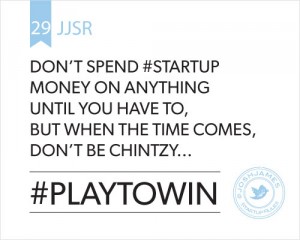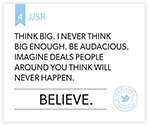JJSR 29 DON’T SPEND #STARTUP MONEY ON ANYTHING UNTIL YOU HAVE TO, BUT WHEN THE TIME COMES, DON’T BE CHINTZY… #PLAYTOWIN
 Don’t spend money until you have to, but when the time comes, do it up right.
Don’t spend money until you have to, but when the time comes, do it up right.
This is a rule I have always lived by since starting my first business.
Before then, I lived by a different rule. My pre-business mantra was don’t buy it unless you absolutely have to, and when you feel like you absolutely have to, then buy the most inexpensive form of whatever it is that you need.
I probably need to include a little bit of background for this to make sense. When my dad was only 14, he kicked his dad out of the house for being a mean drunk. That meant my dad also had to get an after-school, full-time job to help support his family. So he worked at a gas station. He also had a job cleaning out the spittoons in the bar where his mom was a waitress. The point is that my dad values a buck and he shared those values with my five younger siblings and me.
My father’s actual career was serving as a military pilot, and then serving several stints as a pilot who was either striking or flying at Continental Airlines. We always had food. My parents always made sure we felt like we had nice Christmases and birthdays, but we certainly weren’t rolling in it. I had heard my dad say over and over again that no pair of shoes should ever cost more than 25 dollars. We were middle class, but with ups and downs. Our financial pressure and stress came mostly from the financial uncertainty and drastic changes of the airline.
I saw how hard my dad worked. And while he was a trained pilot, he’d often say that he’d shovel manure all day if that was what it took to provide for his family. The last thing I was going to do was cause more pressure by asking for expensive things, even though I knew dad would give me the shirt off his back and get us kids anything we wanted. My mom was always willing to do anything to ensure we were comfortable and would fit in at school. They were awesome that way, but I understood the consequences. Even with six kids my mom would get jobs at delis or department stores so we could have nice clothes. They both killed it and we were happy, but the financial pressure was real, as it always has been for most families.
As the oldest, I felt an extra sense of responsibility towards my family. Because my father flew either in the airlines or as the commanding officer in his Marine Corps C-130 squadron, he was on the road a decent amount of time. He always told me, “You are the oldest. You are the man of the house when I’m gone.” I took it to heart. As I began to learn about personal finance, I took an interest in understanding all of the bills and credit card statements that came to the house. I quickly identified the required payments per month plus extra allocations matched to interest rates to get us out of debt in the earliest possible way. Then I would present the information and my proposed plan to my dad.
When we moved to Houston the summer before my senior year of high school, my dad had just gotten his job back with Continental and my parents decided to build a house in the cheapest housing market in the country. They were so excited—we all were. Believe it or not, I had saved up $30,000 at that point from some acting that I had done. In fact, one commercial for Kellogg’s Honey Smacks paid me $50,000 for three days work. (I’ve been asked a million times to show it, so here it is… check it out and if sales of Honey Smacks go up, I’ll know I still look good next to Diggem’ The Frog!) But anyhow, I had some money and I volunteered to give it to my parents so they could put in a family pool. We all absolutely LOVED it. That was my first experience with understanding that money, when used correctly, can be extremely rewarding. I was never prouder to that point in my life.
I never owned a car until after I was engaged to get married. When I was a student at BYU and needed to get somewhere, I either bummed a ride from my buddies or used the public buses. When dating, I always picked activities that we could walk to or I would borrow a car from a friend.
When we started my first company, we started in my basement apartment and my co-founder’s studio apartment. Finally we moved into an office space and crammed six people into about 100 square feet. It smelled, but it was awesome. When it was time to get a bigger space, we almost didn’t move because the new space seemed too nice. However, when we reached 30 people, we still had one unisex bathroom. We also had one printer and the whole product team had to yell “Printing!” beforehand. Everyone had to save his or her work because the breaker would inevitably trip. But the office was nice-looking. In retrospect, it was probably the minimum we could have gotten away with while still closing customers. People need to see a little bit of success to trust that you know what you are doing. It made people think we were more successful than we deserved, and that helped us get to the next level.
I then bought a nicer car to look a little more like the CEO. I decided to get a used Audi A8 for $26,000. Before the Audi, I drove a Maxima. I loved my Maxima; it was really fast. But when I hired my VP Sales (who ended up taking us from $6 million in sales to $400 million in sales), he later told me that if I had been driving a Maxima, he would have never taken the job, no way, no how. He would have inferred that we were not successful. I guess if we were Facebook and I was driving the Maxima, he might have taken the job, but we weren’t. We were trying to make a buck and trying to compete against 80 VC-backed competitors. I’m glad I bought that Audi and did it up right.
We are now moving into a new office at Domo because we no longer fit where we are and we’re not all under one roof. We are not picking the nicest office park, but we fit. When we move in, I’m not replacing the carpet. I WANT the stains on the carpet. We haven’t made it yet as a company. When we do, then I’ll get the carpet replaced. Until then, it will serve as a great reminder that we need to keep being scrappy. But we do have amazing employees, and I paid for the best people because that is an area I cannot afford to go cheap — and we’ve done it up right.
Josh









